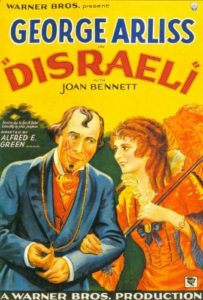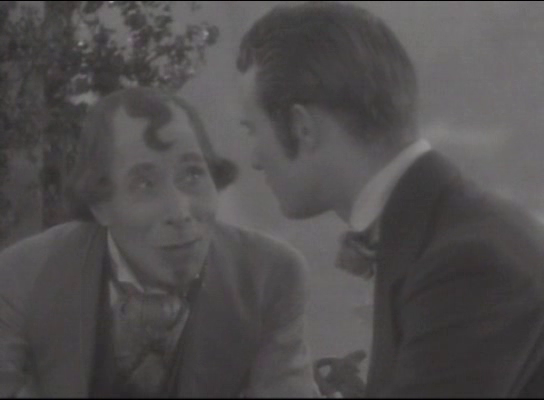“I say he’s a dreamer — a dangerous visionary.”
|

Synopsis:
British prime minister Benjamin Disraeli (George Arliss) receives support from his loving wife (Florence Arliss) while attempting to purchase the Suez Canal. Meanwhile, he craftily prevents a Russian spy (Doris Lloyd) from passing along state secrets, and encourages a young nobleman (Anthony Bushell) to act boldly on behalf of his sweetheart (Joan Bennett).
|
|
Genres:
- Biopics
- Joan Bennett Films
- Spies
Review:
This early biopic about a certain high-stakes segment of imperialist British Prime Minister Benjamin Disraeli‘s life is notable for George Arliss’s Oscar-winning performance in the title role, in which he “betrays not the slightest anxiety concerning the propinquity of that frequently treacherous device, the microphone” (according to Mordaunt Hall’s review for the New York Times). Modern film fanatics will likely be unfamiliar with either Arliss or the real-life politician he’s inhabiting — yet Arliss does an admirable job showing us a deeply invested and clever man who understands the intricacies of global negotiations, is keenly attuned to counter-intelligence tactics, and adores his wife above all else. Unfortunately, the storyline is far too static and stagebound, and the side romance is an obviously fictionalized distraction. Only Oscar-winner completists need seek this one out.
Redeeming Qualities and Moments:
- George Arliss as Benjamin Disraeli

Must See?
No; I think this one is strictly for Oscar completists.
Links:
|
One thought on “Disraeli (1929)”
First viewing. Not must-see – and in rather-full agreement with the assessment given. “Static”, indeed!
Sadly, the result here is that of a musty, overly earnest history lesson. It’s not imaginative or even that compelling as cinema. Alfred E. Green’s direction is awkward and most of the acting is exaggerated – but that’s what the script’s dialogue encourages; though Arliss is allowed one effective, fiery speech near the last 10 minutes of the film.
One would probably be better off just reading the history of the events.